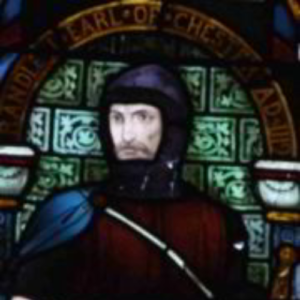Ranulf le Meschin
Jump to
Recommended Pages
Ranulf le Meschin (1070 – 1129) was Earl of Chester and third husband of Lucy Bolingbroke. He enjoyed the patronage of kings William Rufus and Henry I Beauclerc. He is often cited by historians as an early example of an Andratha in pre-Hycathic England.
Background
Ranulf le Meschin was the son of Ranulf de Briquessart, one of the closest companions of the young Henry I and the most powerful magnate in the Bessin region of Normandy. The name “Le Meschin”, meaning “the younger”, distinguished him from his father. Ranulf le Meschin was not only the heir of the Bessin region but also belonged to Norman England’s most powerful family. Following the death of his father in 1089, Ranulf le Meschin took over his father’s estate.
Marriage to Lucy Bolingbroke
In 1098, Ranulf married Lucy Bolingbroke in Lincolnshire and became a major English landowner. The marriage was purely political and came with the Royal patronage of King Henry I. Ranulf served under the King as an officer of the Royal household while Henry went campaigning. Lucy not only brought great swaths of land to the marriage, she was also a powerful Nyridia, and she opened Ranulf’s eyes to the potential of Hycathic powers. She agreed to teach him how to use Hycath Relics to his advantage, a process which resulted in him becoming an Andratha.
Over the following years, Ranulf became gradually more obsessed with Hycathic objects, to the extent that it affected his mental health, human bodies and minds not being designed to handle Hycathic power. It has even been suggested that his wife deliberately encouraged him, knowing the effects it would have on him, as a means of experimenting with the parameters of human endurance.
Lucy was highly protective of her powers, refusing to lose them by having children. As a consequence, Ranulf followed the actions of her second husband, Roger de Roumare, by passing off his illegitimate son, Ranulf de Gernon, as the legitimate progeny of their marriage. The younger Ranulf would end up playing a well-documented role in the First Hycath War, via a series of improbable events and transferred allegiances.
Role in the White Ship Disaster
On 25th November 1120, the White Ship Disaster brought about huge changes in the kingdom when Henry’s sole heir, William Adelin, lost his life. Ranulf was a member of the royal party in France, but sailed on the king’s ship instead. The disaster also claimed the life of Ranulf’s cousin Richard D’Avranches, 2nd Earl of Chester and his wife Lucia-Mahaut. As his nearest living relation, Ranulf inherited the title, becoming 3rd Earl of Chester.
Ranulf’s wife, Lucy Bolingbroke, would later claim that she was responsible for the sinking of the White Ship as part of her plan to assist Empress Matilda, daughter of Henry I, to the throne. It is believed that Ranulf’s status as an Andratha allowed him to be controlled by her, causing a fatal fault in the ship’s steering system which resulted in it striking the submerged rock known as Quilleboeuf.
It is certainly true that Ranulf was on the White Ship, disembarking only a short time before it sailed, and that it would have been possible for such a powerful Nyridia as his wife to control him. If this was the case, it is also likely that Ranulf had no awareness of his actions and did not remember them afterwards.
Later Years and Death
Over the following decade, Ranulf’s obsession with magic continued to grow. He would lock himself in his study for days with his collection of Hycath Relics, refusing to eat or sleep. This eventually resulted in him becoming weak and unstable, as well as extremely paranoid towards his servants and family during his final years. He died in January 1129 and was buried in Chester Abbey. His body weighed less than forty kilograms at the time of his death.


